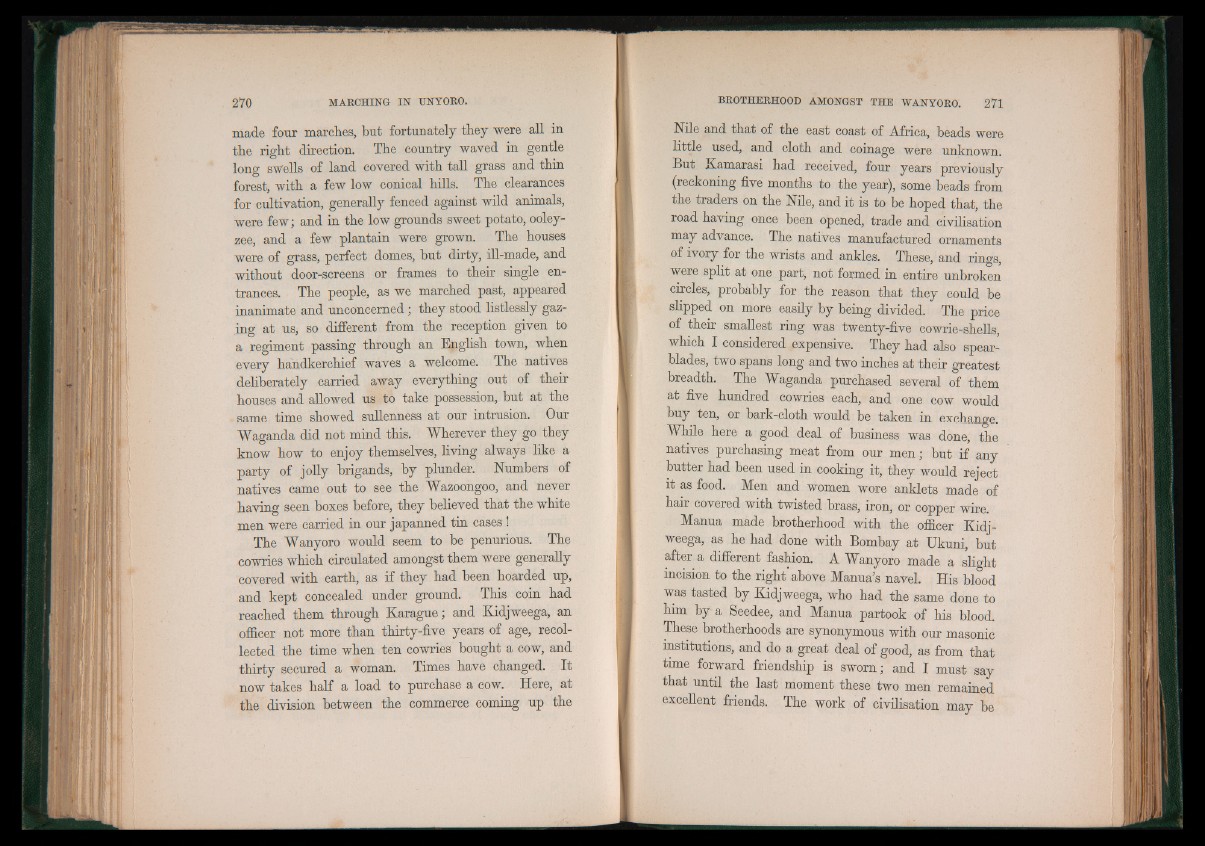
made four marches, but fortunately they were all in
the right direction. The country waved in gentle
long swells of land covered with tall grass and thin
forest, with a few low conical hills. The clearances
for cultivation, generally fenced against wild animals,
were few; and in the low grounds sweet potato, ooley-
zee, and a few plantain were grown. The houses
were of grass, perfect domes, but dirty, ill-made, and
without door-screens or frames to their single entrances.
The people, as we marched past, appeared
inanimate and unconcerned; they stood listlessly gazing
at us, so different from the reception given to
a regiment passing through an English town, when
every handkerchief waves a welcome. The natives
deliberately carried away everything out of their
houses and allowed us to take possession, but at the
same time showed sullenness at our intrusion. Our
Waganda did not mind this. Wherever they go they
know how to enjoy themselves, living always like a
party of jolly brigands, by plunder. Numbers of
natives came out to see the Wazoongoo, and never
having seen boxes before, they believed that the white
men were carried in our japanned tin cases !
The Wanyoro would seem to be penurious. The
cowries which circulated amongst them were generally
covered with earth, as if they had been hoarded up,
and kept concealed under ground. This coin had
reached them through Karague; and Kidjweega, an
officer not more than thirty-five years of age, recollected
the time when ten cowries bought a cow, and
thirty secured a woman. Times have changed. It
now takes half a load to purchase a cow. Here, at
the division between the commerce coming up the
Nile and that of the east coast of Africa, beads were
little used, and cloth and coinage were unknown.
But Kamarasi had received, four years previously
(reckoning five months to the year), some beads from
the traders on the Nile, and it is to be hoped that, the
road having once been opened, trade and civilisation
may advance. The natives manufactured ornaments
of ivory for the wrists and ankles. These, and rings,
were split at one part, not formed in entire unbroken
circles, probably for the reason that they could be
slipped on more easily by being divided. The price
of their smallest ring was twenty-five cowrie-shells,
which I considered expensive. They had also spear-
blades, two spans long and two inches at their greatest
breadth. The Waganda purchased several of them
at five hundred cowries each, and one cow would
buy ten, or bark-cloth would be taken in exchange.
While here a good deal of business was done, the
natives purchasing meat from our men; but if any
butter had been used in cooking it, they would reject
it as food. Men and women wore anklets made of
hair covered with twisted brass, iron, or copper wire.
Manua made brotherhood with the officer Kidjweega,
as he had done with Bombay at Ukuni, but
after a different fashion. A Wanyoro made a slight
incision to the right above Manua’s navel. His blood
was tasted by Kidjweega, who had the same done to
him by a Seedee, and Manua partook of his blood.
These brotherhoods are synonymous with our masonic
institutions, and do a great deal of good, as from that
time forward friendship is sworn; and I must say
that until the last moment these two men remained
excellent friends. The work of civilisation may be